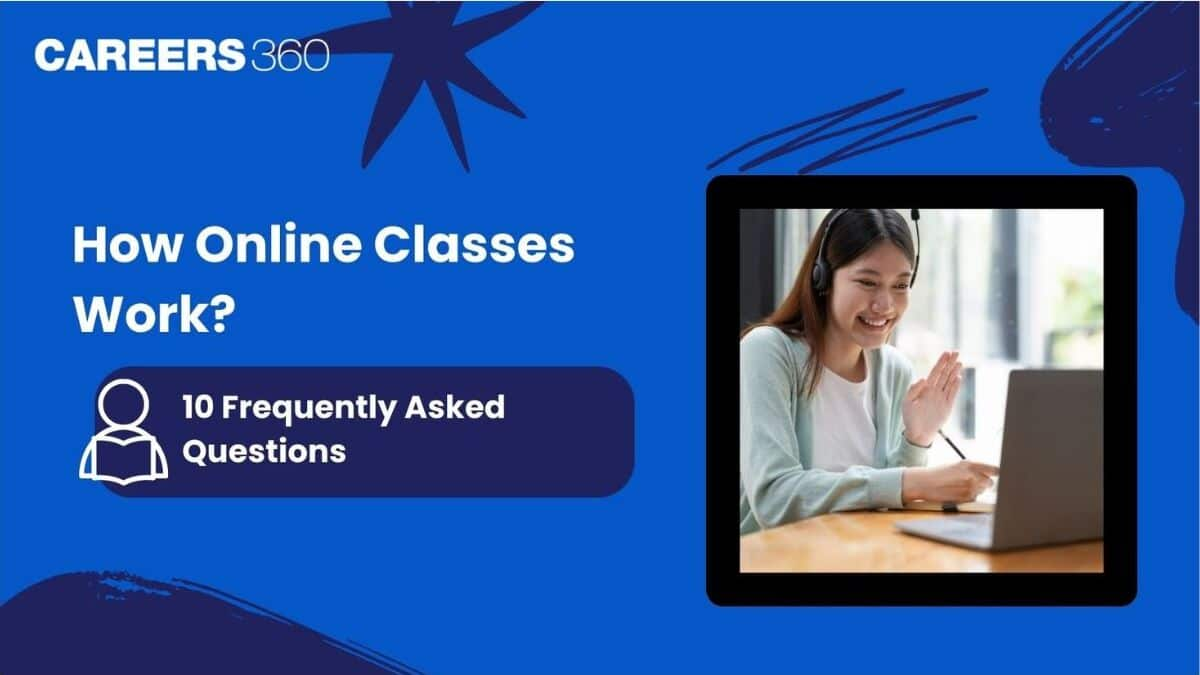How Online Classes Work: 10 Frequently Asked Questions
Online classes have changed the way people learn. They remove barriers of location and time, offering access to quality education from anywhere. The flexibility of virtual classrooms and online degree courses helps students balance studies with work and other commitments, making education more inclusive.

The popularity of e-learning is rising quickly across India and the world. More than 80 universities offer online degree programmes providing several course benefits to students along with access to several specialisations. Learners can attend lectures, submit assignments, and interact with teachers through digital platforms.
With technology evolving continuously, online education has emerged as a viable alternative to traditional degree courses. This article explores ten frequently asked questions about online classes, how they work, technology required, and the challenges that students can face.
1. What Are Online Classes, And How Do They Work?
Online classes involve courses that are delivered over the internet through virtual platforms. These courses are online degree programmes at undergraduate and postgraduate levels in several disciplines. Online classes differ from traditional classroom experiences by providing:
- Recorded or live lectures
- Digital study material
- Assignments and assessments
- Discussion forums and collaborative projects
Online classes utilise learning management systems to deliver lectures, assignments, and assess students digitally.
2. What Technology Is Required For Online Learning?
Online learning requires minimal equipment, making it accessible to a wide audience. The basic requirements include:
- A computer, laptop, or smartphone
- A stable internet connection with sufficient speed
- An updated web browser for smooth access
- Headphones or speakers for better audio quality
- Webcam and microphone for interactive sessions
Several universities also provide learners access to mobile applications, enabling them to download resources and continue studying offline.
Also Read: Online Degrees vs Short-Term Online Courses: What Should You Choose?
3. How Is Course Content Delivered And Assessed?
Several universities use learning management systems and a mix of digital tools to keep learners engaged. Course delivery typically includes:
- Pre-recorded lectures and reading material
- Interactive modules such as quizzes, case studies, and polls
- Assignments and projects submitted online.
- Student Assessments and instructor feedback
Assessment in online classes is transparent, often supported by progress dashboards to help learners track achievements and course completion.
4. Can Learners Interact with Teachers and Classmates?
Online education is not limited to independent learning, students are encouraged to interact with their peers and teachers. They are provided with:
- Discussion boards and forums
- Live chats and Q&A sessions with instructors
- Collaborative group projects
- Peer-to-Peer networking opportunities
These features foster a sense of community and engagement, ensuring that online learning remains interactive.
5. Do Online Classes Provide Completion Degrees?
Students earn formal degrees after completing online degree courses, which can enhance professional profiles such as LinkedIn. Universities partner with platforms to offer degrees, diplomas, and specialisations online. These credentials support career growth and showcase continuous learning, helping professionals stay competitive in today’s competitive job market.
6. What Are The Benefits And Challenges Of Online Learning?
While there are several benefits of online learning, there are numerous challenges that students have to face while attending online classes. These are:
Benefits
- Flexibility to learn at any time
- Access to global teachers and resources
- Lower costs compared to traditional courses
- Wide variety of subjects and skills
Challenges
- Self-discipline is required to maintain consistency
- Limited face-to-face interaction with teachers
- Higher dropout rates due to lack of motivation
- Technical difficulty, connectivity issues, or unfamiliarity with digital tools.
The advantages often outweigh the challenges, especially for working professionals and students who prefer flexible schedules.
Also Read: How Do Online Degrees Shape the Digital Leaders of Tomorrow?
7. What Types of Support Do Online Learners Receive?
Online learners typically receive support such as:
- Instructor support via email or live sessions.
- Technical support for platform issues
- Career or academic support in several online degree programmes.
This kind of support ensures that learners overcome challenges and remain engaged throughout the course.
8. Are Online Classes Accredited By Universities?
The University Grants Commission (UGC) approves several online degree courses at UG and PG levels, thus contributing to its national and global credibility. Learners should always check for official recognition and validity before enrolling.
9. How Secure Is Online Learning For Personal Data?
UGC-approved and reputable universities utilise secure platforms that ensure data privacy and security through encrypted connections, secure logins, and strict data policies. Learners are encouraged to use strong passwords and secure devices to protect personal information.
10. Can Online Learning Replace Traditional Classroom?
While online classes offer flexibility and convenience, they accompany traditional classrooms, rather than replace them. However, several programmes that require lab-based sciences or clinical experience benefit students through in-person learning.
Online classes have redefined the way people learn. They provide affordable, flexible, and accessible education across fields to help students enhance their knowledge and skills in their preferred areas of education. With the right university and discipline, online courses can open new doors to personal and professional growth.
Frequently Asked Questions (FAQs)
Yes, students can pursue a government job after completing a UGC-approved online degree, as these degrees are recognised for eligibility in most government exams and positions.
Students will be able to gain skills in domains such as management, communication, IT, and commerce.
The fee of online degree courses varies depending on the programme levels, and the institute, ranging between Rs 8,000 to Rs 20,00,000.
Employers accept online degrees provided they are approved and recognised by UGC.
Yes, online courses are flexible and designed for working professionals. Learners can access lectures at any time and complete assignments as per their schedule.